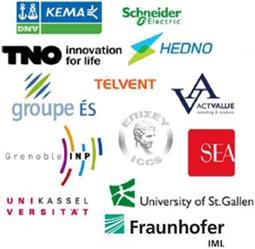DREAM

Distributed Renewable resources Exploitation in electric grids through Advanced heterarchical Management
Overview
Period: 01/09/2013 – 31/08/2016
Project Coordinator: Grenoble INP, (France)
Project website: http://www.dream-smartgrid.eu/
Funded by: Seventh Framework Programme, European Commission
Partners
Grenoble Institute of Technology (France)
University of St.Gallen (Switzerland)
KEMA NEDERLAND BV (Netherlands)
Societa Per Azioni Esercizi Aeroportuali SEA (Italy)
Telvent Energia - part of Schneider Electric (Spain)
TNO (Netherlands), ActValue Consulting & Solutions (Italy)
Fraunhofer Institute for Material Flow and Logistics (Germany)
University of Kassel (Germany), ICCS- NTUA (Greece)
Electricité de Strasbourg (France), HEDNO (Greece)

Objectives
The DREAM project will lay the foundations for a novel heterarchical management approach of complex electrical power grids, providing new mechanisms for consumer involvement in economical and ecological electricity use as well as stable and cost effective integration of distributed renewable resources.
Applying the principles of autonomous agent-based systems to the control and management of the electricity distribution grid will allow the system to constantly adjust to current operational conditions and make it robust to exogenous disturbances. In turn, this will allow for greater penetration of intermittent resources and will make the distribution grid more resilient to failures. DREAM will include several layers of controls for normal, congested and post-contingency situations that will use different coordination strategies ranging from market-based transactions to emergency demand response and create ad-hoc federations of agents that will flexibly adjust their hierarchy to current needs.
The system will transition smoothly between control layers depending on local operational conditions, so that responses to disturbances will be sized precisely, margins will be used parsimoniously and full network flexibility will be tapped. The system will involve only limited data transfers and no centralized control, promoting extensibility, heterogeneity and easy deployment across countries with different network architectures and hardware manufacturers.
DREAM will demonstrate the economic and technical feasibility of these novel control mechanisms thanks to several real-world small-scale pilots dedicated to different use-cases, and computer simulations will be used to study further scalability. Furthermore, economic viability will be model and examined for the various actors in the grid taking into account the unpredictability of consumer power production, market dynamics, novel regulation schemes and the adoption of DREAM mechanisms over time.

